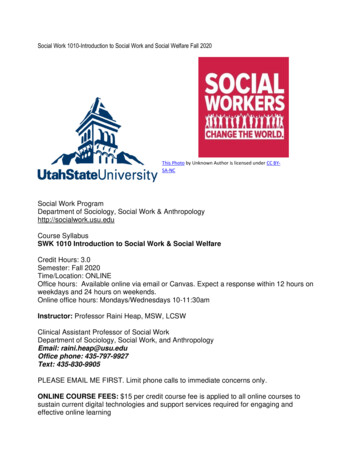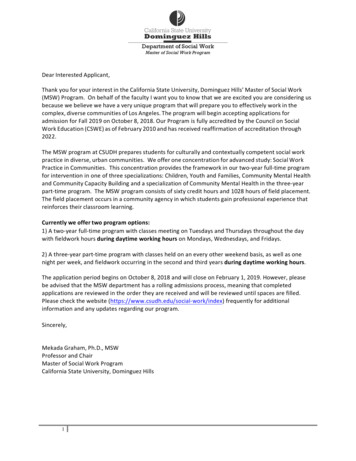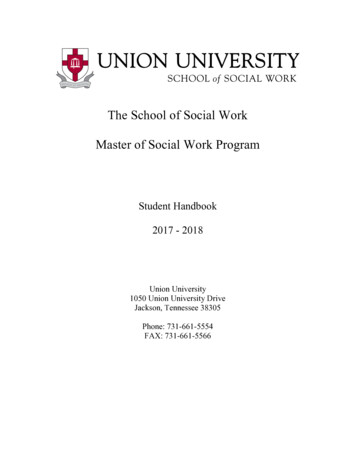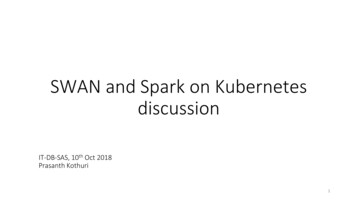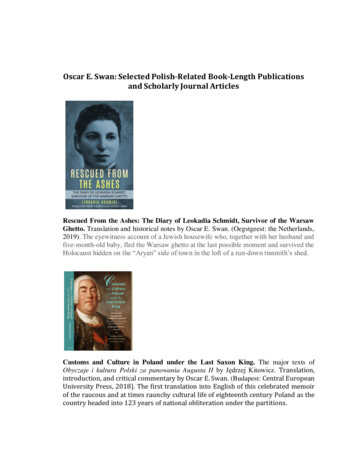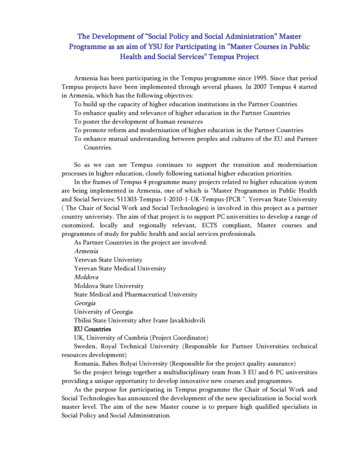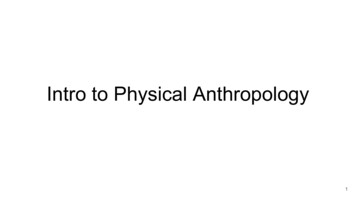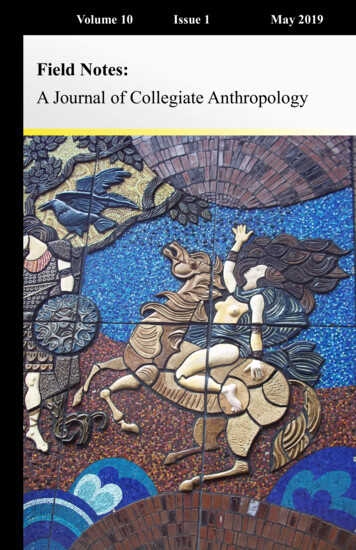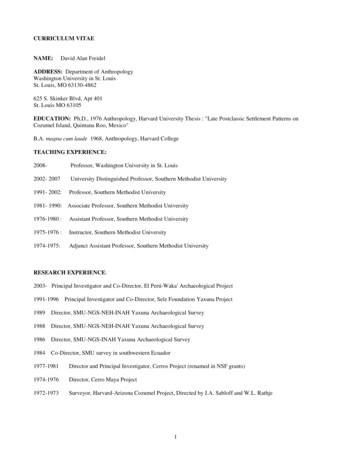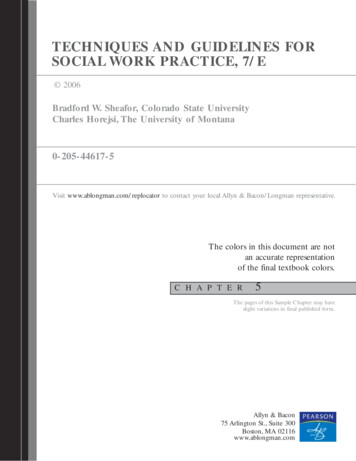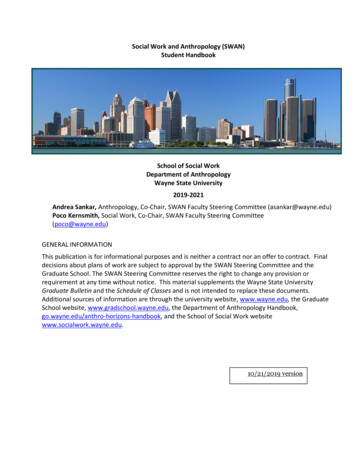
Transcription
Social Work and Anthropology (SWAN)Student HandbookSchool of Social WorkDepartment of AnthropologyWayne State University2019-2021Andrea Sankar, Anthropology, Co-Chair, SWAN Faculty Steering Committee (asankar@wayne.edu)Poco Kernsmith, Social Work, Co-Chair, SWAN Faculty Steering Committee(poco@wayne.edu)GENERAL INFORMATIONThis publication is for informational purposes and is neither a contract nor an offer to contract. Finaldecisions about plans of work are subject to approval by the SWAN Steering Committee and theGraduate School. The SWAN Steering Committee reserves the right to change any provision orrequirement at any time without notice. This material supplements the Wayne State UniversityGraduate Bulletin and the Schedule of Classes and is not intended to replace these documents.Additional sources of information are through the university website, www.wayne.edu, the GraduateSchool website, www.gradschool.wayne.edu, the Department of Anthropology Handbook,go.wayne.edu/anthro-horizons-handbook, and the School of Social Work websitewww.socialwork.wayne.edu.10/21/2019 version
T ABLEOFC ONTENTSTable of Contents . 1Introduction . 3Social Work and Anthropology faculty . 3SWAN Policies and Procedures . 3Admission to the SWAN Doctoral Program . 3SWAN Advisors . 4SWAN Program Curriculum . 4Pre-MSW SWAN Students. 5Foreign Language Requirement . 6Completing the MSW Plan of Work . 7MSW Graduation Requirements . 7Registering for Doctoral Classes . 7Dissertation Credits . 7Grading . 8Repeating Courses . 8Academic Termination And Reinstatement Policy . 81.0Termination from the Social Work and Anthropology (SWAN) Program . 82.0Request for Reinstatement to the SWAN Program . 93.0Reinstatement Procedures . 10Grade Appeals Procedures . 11Course Equivalencies . 11Directed Study . 11Withdrawal from the SWAN Program . 11Readmission. 12Leave of Absence . 12Individual Development Plans (IDPs) . 12Annual Review . 12Time Limits. 13Request for a Time Extension . 13Plan of Work . 13Academic Progression Policies . 14Academic Advisors . 14Expectations Of Academic Advisors . 15
Expectations of Students . 15Meeting With Your Advisors . 16Scholarships and Financial Aid . 16Sources of Support for Doctoral Students . 16Funding available at Wayne State . 16External Funding Sources . 17Travel Awards . 17Social Work . 17Anthropology . 18SWAN Qualifying Examinations . 18Purpose of the SWAN Qualifying Examinations . 18Swan Exam Process . 18Academic Integrity on Qualifying Exams. 19Candidacy . 19Required Form . 20Procedure . 20Dissertation policies . 20Prospectus and Institutional Review Board approval . 20Conflict of Interest . 21The Defense Year . 21Defending the Dissertation . 21After the Defense . 23Degree Certification . 23Commencement . 23Appendix A: University Policies . 25Ombudsperson Office . 25Student Due Process . 25Appendix B: Graduate School Forms . 26APPENDIX C: SCHOOL OF SOCIAL WORK POLICIES. 26School of Social Work Academic Integrity Policy . 26Non Discrimination Policy . 26Incomplete Grade Policy . 26Grade Appeals Procedures . 262
I NTRODUCTI ONWelcome to the Social Work and Anthropology (SWAN) program.The Social Work/Anthropology Ph.D. is a trans-disciplinary doctoral degree program that draws on thestrengths and orientations of both disciplines in theory, social history, research, policy and practice.The SWAN doctoral degree program combines the approaches of each discipline to make use of itsurban location to foster scholarship focusing on global issues of 21st century post-industrial cities andhow these cities are being re-invented. As a student in SWAN, you will receive a thorough grounding inthe theoretical, methodological, and applied aspects of both Social Work and Anthropology, and willapply this knowledge to areas of interest focusing on urbanism, global studies, structural inequalities,and social/cultural organization. The SWAN curriculum draws from existing courses in each disciplinewith the addition of a SWAN seminar that integrates the two disciplines. Our program featuresoutstanding scholars with successful programs of funded research, strong publishing records, andextensive community ties. Students will benefit from having two advisors: one from Social Work; onefrom Anthropology.The curriculum will include MSW coursework leading to the MSW degree for those who do not havethis degree.S OCI AL W ORKANDA NTHROPOLOGYF ACUL TYAndrea Sankar, Anthropology, Co-Chair, SWAN Faculty Steering Committee(asankar@wayne.edu)Poco Kernsmith, Social Work, Co-Chair, SWAN Faculty Steering Committee(poco@wayne.edu)Michael Kral, Social Work, SWAN Faculty Steering Committee(michael.kral@wayne.edu)Mark Luborsky, Anthropology & Institute of Gerontology, SWAN Faculty Steering Committee,(mluborsky@wayne.edu)Tam Perry, Social Work, SWAN Faculty Steering Committee,(teperry@wayne.edu)Jessica Robbins, Anthropology & Institute of Gerontology, SWAN Faculty Steering Committee(jessica.robbins@wayne.edu)Faith Hopp, Social Work, (faithhopp@wayne.edu)Profiles of Anthropology anthropologyProfiles of Social Work Graduate AN P OL I CI ESA DMI SSI ONANDTO THEP ROCEDURESSWAN D OCTORAL P ROGRAMSee http://www.clas.wayne.edu/SWAN/How-to-Apply3
SWAN A DVI S ORSStudents are assigned advisors to guide them in their progress in SWAN; one advisor from theSchool of Social Work and one from the Department of Anthropology. At least one of theseadvisors must be on the SWAN steering committee. Students who wish to change advisorsmust petition the SWAN steering committee at which point the steering committee willconsider the appointment of a different advisor.SWAN P ROGRAM C URRI CUL UMThe SWAN PhD program has both required courses and some individualized study options. You willmake most of the decisions regarding your training and study together with your advisors as well asother members of your dissertation committee. The Graduate Directors and the SWAN SteeringCommittee are also involved in tracking and overseeing graduate student progress through the PhDprogram. The distribution of degree requirements is as follows:SWAN CoursesStudentswith anMSWSocial Work - Practice/Policy Courses (Foundation)SW 7040 - Methods of SW Practice (FALL)SW 7998 - Concentration Field Work (8 CREDITS F&W)SW 7055 - Foundations Group Theory & Practice (WINTER OR S/S)SW 7065 - Foundations Macro Theory & Practice (WINTER)SW 9260 – Current and Historical Trends in Social Welfare PolicySocial Work – Advanced Year Courses (ICPL Concentration Example*)SW 8048 Social Action Research and Evaluation,orSW 7990-SWAN independent studyXXXXXXICPl platform options (one of the following) 8075 (community - fall only) or 8065 (leadership - fall only) or 8085 (policy - winter only).XXSW8998 - Concentration Field Work (8 CREDITS F&W)Social Work – Advanced Year Courses (IP Concentration Example*)SW 8340/8360 or 8380 Practice Theory/HBSE course (FALL)SW 8350/8370 or 8390 Practice Theory/HBSE Course (WINTER)SW8770 Advanced Policy Analysis and Reform (F, W or S/S)SW8115 DSMV (F, W or S/S)SW8998 - Concentration Field Work (8 CREDITS F&W)Social Work – Research/TheorySW 9100 – Social Statistics & Data AnalysisSW 9210 – Theories for Practice & Research with IndividualsStudentswithout anMSWXXXXXXXXX4
SW 9220 - Theories for Social Work Research & Practice with Families/GroupsSW 9230 – Theories for Practice & Research with Communities/OrganizationsSW 9300 - Applied Regression and Linear ModelsSW 9410 - Quantitative Research in Social WorkAnthropology – Research/TheoryANT 5060 - Urban AnthropologyANT 5140 - Biology and CultureANT 5320 - Language and SocietyANT 5700 – Applied AnthropologyANT 7005 – Anthropology Proseminar IANT 7010 – Anthropology Proseminar IIANT 7200 – Qualitative Research IANT 7210 – Qualitative Research IITwo (2) ANT electives in the student's research area [1]SWAN – TheorySW 9697- Integrative Seminar in Social Work and AnthropologyANT 7780 - Conceptualizing the DissertationXXXXXXXXXXXXXXXXXXXXXXXXXXXXXXXXP RE -MSW SWAN S TUDENTSP RE -MSWSTUDENTS REQUIRED MEETINGPre-MSW students should plan a meeting with their MSW advisor and the doctoral director duringtheir first semester in the program to discuss and finalize their MSW/PhD plan of work. Students mayselect either the Innovation in Community, Policy, and Leadership (ICPL) or the Interpersonal PracticeConcentration (IPC). Students should make this decision in consultation with their advisors (MSW, PhD)and the social work doctoral director. Final decisions on waiving MSW requirements for pre-MSWSWAN students are at the discretion of the MSW coordinator.P RE -MSWWAI VED COURSESThe following courses are typically waived for Pre-MSW SWAN students, as similar coursework isoffered in the PhD curriculum: SW7560 HBSE I; SW7660 HBSE II; SW7820 research I; SW7830 researchII; six credits of MSW electives. Policies on other requirements are noted in the following sectionsP RE -MSW S OCI AL A CTI ON R EQUI REMENT (ICPL S TUDENTS )In lieu of SW 8048, Social Action Research, students may take the MSW-Level independent studycourse, SW 7990. However, they are required to take this course as an independent study according tothe requirements outlined in Appendix A.5
P RE -MSW P OLI CYREQUI REMENTSMSW ICPL pre-MSW SWAN students may substitute SW 9260, Current & Historical Trends in U.S. SocialWelfare Policy (see below) in for 7720MSW IP pre-MSW SWAN students may substitute SW 9260, Current & Historical Trends in U.S. SocialWelfare Policy (see below) in for 7720. However, they will still need to take the SW8770 (advancedpolicy analysis) requirement.F OREI GN L ANGUAGE R EQUI REMENTBefore achieving PhD candidacy, a student working in a non-English setting must demonstrateproficiency in a scholarly language other than English through completing a translation test. Weencourage doctoral students with this interest to fulfill the language requirement as soon aspossible.In conjunction with your faculty advisor, you will identify the language other than English mostrelevant to your scholarly work. This should be a language that has a substantial scholarly literature,such as a relevant academic journal. Complete the Language Proficiency Form at least a week inadvance of taking the exam and submit it to the Graduate Director for the Department ofAnthropology. Your advisors, or another faculty member in the department, will select a scholarlypassage in that language, roughly 300 words in length, on a subject related to your dissertationresearch. If no member of the department is competent in the selected language, another WSUfaculty member may select the passage. The examination is held in the Anthropology Department andshould be scheduled with the Anthropology Director of Graduate Studies. You have 90 minutes tocomplete the examination with the aid of a printed bilingual dictionary, but no electronic aids.The examination will be evaluated by the faculty advisor directing the portion of your research thatrequires a field language, or if the faculty advisor is not competent in the language, another WSUfaculty member identified by the advisor will evaluate the exam. The translation should be areasonable functional translation that demonstrates your ability to competently read the language andunderstand the argument of the passage. Minor errors that do not affect comprehension arepermitted. A student who does not pass may retake the examination as needed.With the concurrence of the Anthropology advisor that the language in question is relevant to theirresearch, the following students are exempt from the language examination:-Students who have a degree or diploma from an institution taught in the language;Students who have taken within the past five years, an upper-division (4000-level or higher)course in composition or literature in the language;Students who can demonstrate proficiency from a research paper or similar work written in thelanguage.Students who have held positions of responsibility that require fluency in the field language forat least 2 years.6
Students admitted to the PhD program in 2017 or earlier have the option of fulfilling the languagerequirement in the system in place at the time of their admission, i.e., by completing three semestersof the same foreign language at the college level before taking qualifying exams. Courses taken atother institutions including community college fulfill this requirement. If a student elects to takeundergraduate language courses rather than pass the exam, the student must receive a C or better.The courses do not count toward their degree and are not part of the plan of work.Students planning a dissertation project in a site requiring a fieldwork language other than English maybe required by their Dissertation Committee to demonstrate field language proficiency above andbeyond the above language requirements. Your Dissertation Committee may require the completion ofa written or oral test in that language.C OMPL ETI NG THE MSW P L AN OF W ORKThe MSW degree is a required degree for the PhD in Social Work and Anthropology. For students whodo not yet have an earned MSW degree prior to program matriculation, students should work closelywith the MSW student advisor and Field Coordinator to plan the student’s degree program. In the firstMSW year, students will take Core Courses and in the second year, SWAN students will select aconcentration. The MSW plan of work, which requires approval from the MSW coordinator, mustshow which MSW courses are being taken and which doctoral level courses are substituting forrequired MSW courses or serving as electives in the MSW program.MSW G RADUATI ON R EQUI REMENTSSixty credits are needed for an MSW, and some courses will count towards both the MSW and Ph.D.You should stay in touch with your MSW advisor to ensure that you are on trac
Wayne State University 2019-2021 Andrea Sankar, Anthropology, Co-Chair, SWAN Faculty Steering Committee (asankar@wayne.edu) Poco Kernsmith, Social Work, Co-Chair, SWAN Faculty Steering Committee (poco@wayne.edu) GENERAL INFORMATION This publication is for informational purposes
